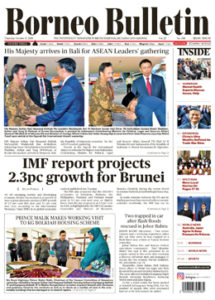ASEANews Headlines: BRUNEI- IMF report projects 2.3 per cent growth for Brunei
AS AN emerging market and developing economy, Brunei Darussalam is projected to have a gross domestic product (GDP) growth of 2.3 per cent this year and 5.1 per cent next year, according to the International Monetary Fund (IMF) in its global economic outlook published last Tuesday.

The IMF also projected that the ASEAN-5 economies of Indonesia, Malaysia, the Philippines, Thailand, and Vietnam would grow at 5.2 per cent next year, or slightly lower than the last projection at 5.3 per cent in 2018, as highlighted by the IMF’s Economic Counsellor and Director of Research, Maurice Obstfeld, during the recent World Economic Outlook press briefing in Nusa Dua, Bali.
As trade tensions between the US and its trading partners have started to hit economic activities worldwide, the IMF has cut its global growth forecasts, stating that the global economy is now expected to grow at 3.7 per cent both this year and next year – which is 0.2 percentage points down from an earlier forecast.
The report, published twice a year in April and October, is widely read by both public and private sectors globally for the IMF’s assessment of the world economy.
The latest edition was released as thousands of finance officials and professionals gathered in Bali, Indonesia, for the IMF and World Bank annual meetings.
The rate of 3.7 per cent growth exceeds that achieved in any of the years between 2012 and 2016, which occurs as many economies have reached or are nearing full employment; and as earlier deflationary fears have dissipated. Thus, policymakers still have an excellent opportunity to build resilience and implement growth-enhancing reforms.
Last April, at the time of the last World Economic Outlook, the world economy’s broad-based momentum led the IMF to project a 3.9 per cent growth rate for both this year and next.
Considering developments since then, however, that number now appears over-optimistic.
Rather than rising, growth has plateaued at 3.7 per cent.
“There are clouds on the horizon. Growth has proven to be less balanced than we had hoped,” said the IMF in its report. “Not only have some downside risks that the last World Economic Outlook identified been realised, the likelihood of further negative shocks to our growth forecast has risen.
“In several key economies, moreover, growth is being supported by policies that seem unsustainable over the longer term.
“These concerns raise the urgency for policymakers to act.
“Some challenges for many advanced economies centre on the slow growth of workers` incomes, perceptions of lower social mobility, and in some countries, inadequate policy responses to structural economic changes.”
| Azlan Othman | Borneo Bulletin
ASEAN NEWS STAND FRONT PAGES:


 All photographs, news, editorials, opinions, information, data, others have been taken from the Internet..aseanews.net | [email protected] / For comments, Email to : Aseanews.News
All photographs, news, editorials, opinions, information, data, others have been taken from the Internet..aseanews.net | [email protected] / For comments, Email to : Aseanews.News









